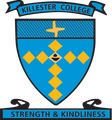Wellbeing

Dear Parents and Guardians,
Term 4 will see continued remote learning for most of our students and, as such, the issue most prominent is how to continue to motivate students both at school and from home. See below for some tips to consider.
We have two priorities here:
- Engage your daughter by giving them more control and autonomy and helping them feel more related to their friends.
- Motivate your daughter by setting up the environment and schedule to support her in staying focused, so they begin to enjoy a sense of mastery and competence.
Here's your guide:
1. Consciously create opportunities for your daughter to connect with other children.
One of the reasons that young people doing remote learning often feel disengaged and demotivated is that they feel isolated. Teenagers like to be part of groups and naturally engage more with schoolwork when they are participating, so find ways to counter the isolation so many teenagers are feeling.
Encourage your daughter to find a learning buddy: Your daughter can set up a regular time with another student in her class so they can meet on zoom to do assignments together or quiz each other.
2. Create a predictable daily rhythm with a routine.
If you don't have a schedule, then every moment becomes an opportunity for a power struggle over what comes next. Routines replace chaos with the reassurance that life is unfolding as it was meant to. Routines also develop the prefrontal cortex, as the young person comes to know what to expect. Finally, routines help teenagers manage themselves through less interesting tasks because they have something positive to look forward to.
- Create a clear start to learning each day. Have your daughter get ready as if they're going to school, instead of lolling on their bed in their jammies.
- If you want your daughter to follow the schedule, let them make it.
- Teenagers need a break every 45-60 minutes to move around, with frequent breaks for refueling activities.
Use an accountability system that lets your daughter self-direct as much as possible.
Self-direction meets your daughter’s need for autonomy, which is motivating and heads off nagging and power struggles.
Let your daughter choose what to complete and when. Do they want to tackle their hardest subject first or leave it until last? That's their call.
If your child resists getting started, ask them how many minutes they can work on this first task before taking a break, and what they want to look forward to doing during that break.
Set up a space that signals learning.
In the same way that beds induce sleepiness, or plates on the table signal that it's time to eat, your daughter needs a workplace that reminds them that this is study time.
Students do have school holidays to look forward to. Of course, with the current restrictions the way they spend school holidays will not be the same. There are options though. The City of Greater Dandenong has a holiday program and Killester is offering a holiday program – both are virtual and very creative, offering opportunities for young people to connect. And of course, we have Spring – the sun will be shining, and the days will be warmer – lots of opportunities for a daily 5km walk.
Included in this newsletter is an additional article from Parenting Ideas – Staying the course in COVID times:
COVID-19 continues to test us in ways that were unimaginable at the start of 2020. It’s becoming the defining event of this generation and a reference point for decades to come. We’ve had depression kids, war kids and now we have COVID-19 kids.
The impact of COVID-19 is felt differently across the country. Currently, Victoria is in Stage 4 lockdown while other states are on high alert. Not every student is working from home, but most students are COVID conscious, knowing that they’re only a corona
cough or virus-filled hug away from remote learning.
Encouraging kids to stay the course when they’ve been denied access to the classroom, peers and community activities is now a common parenting challenge. Denial is generally tolerable in the short term, but the novelty of changed circumstances soon wears off. The following strategies will assist both parents and kids to stay the COVID long course:
Accept difficult emotions
‘There’s nothing so bad that we can’t talk about, but there are behaviours that we won’t accept’ is a mantra that serves families well. It’s okay for children to feel frustrated, annoyed, angry or upset about their change of circumstances due to the pandemic but that doesn’t give them permission to behave disrespectfully, miss school requirements or fail to assist at home. It helps if parents validate how their children feel, then encourage them to focus on fulfilling school and family expectations.
Encourage acceptance
Some children and young people will protest the COVID induced changes that have been imposed upon them. In some respects, it may be admirable for children to push for a better deal, but the severity of the COVID-19 pandemic means that the individual needs to bend toward the greater community good. This is simply a case of accepting and making the best of the situation at hand.
Take it one day and week at a time
On family bush walks my young children would rarely complain when the tracks were windy. The complaint levels rose when paths were long and straight as the finish line seemed such a long way o. In a similar vein during our current times it’s smart to keep kids focused on getting through each day and week rather than look too far ahead. Six weeks of Stage 4 may seem intolerable, so it’s better to focus on getting through each day and week.
Be the hope person
Help children and young people understand that they will get through difficult times. “This too shall pass” is perhaps the most apt meme for our times. If your hope bucket is emptying out, seek out positive friends and relatives who can top it up. Our own resilience needs nurturing if we are to last the distance.
The internal parenting manual that guides us probably doesn’t include chapters dealing with remote learning, lack of peer interaction and kids’ disappointment. Most of us are treading new parenting ground so it’s best to be open to change, accepting of difficulties and forgiving of inevitable parenting stumbles.
Michael Grose
Michael Grose, founder of Parenting Ideas, is one of Australia’s leading parenting educators. He’s an award-winning speaker and the author of 12 books for parents including Spoonfed Generation, and the bestselling Why First Borns Rule the World and Last Borns Want to Change It. Michael is a former teacher with 15 years experience, and has 30 years experience in parenting education. He also holds a Master of Educational Studies from Monash University specialising in parenting education.
Remember our Wellbeing Team has created a new website which is filled with vital support material. There are links to mindfulness and meditation apps, links to helpful wellbeing fact sheets, Child Safe material and links to external support agencies like Headspace. You can find the link on the Killester College website, next to the SchoolsTV logo.
Wishing all families and students a safe and rejuvenating Term 3 break
Regards
Luana Doko
Wellbeing Leader
